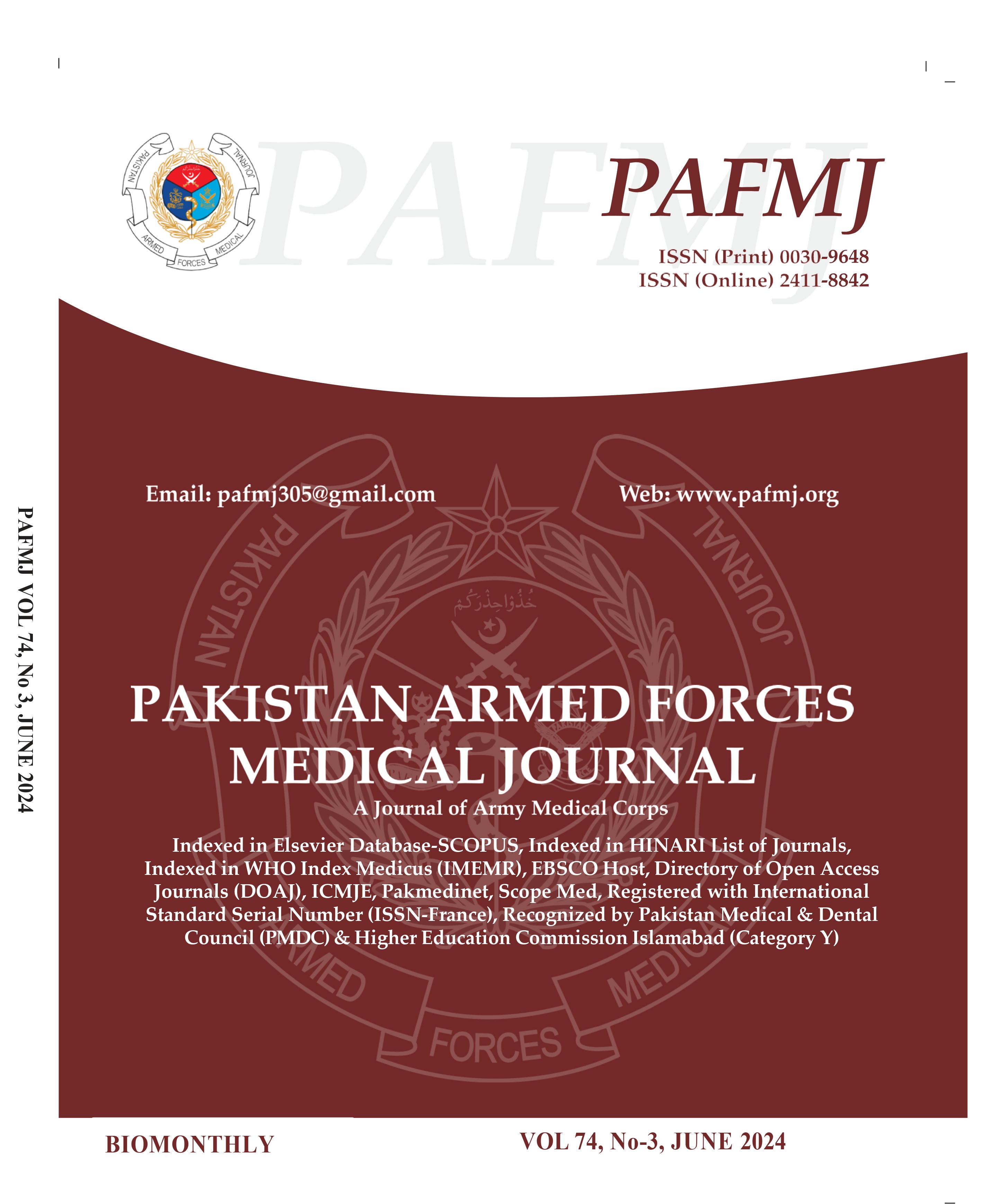Paraphenylenediamine (PPD) Poisoning: A Case with a Fatal Outcome
DOI:
https://doi.org/10.51253/pafmj.v74i3.10880Keywords:
Black stone, Oedema, Paraphenylenediamine (PPD) poisoning.Abstract
In developing countries, people use Paraphenylenediamine, a highly toxic substance, for suicide and self-harm. It is more common in populations with lower socioeconomic classes and educational backgrounds. The female-to-male ratio is higher. The most common complications are oedema of the upper airway tract and renal failure. The mortality rate is higher due to late hospital presentation and a lack of specific antidotes. The treatment of Paraphenylenediamin poisoning is conservative. In this case report we are presenting Paraphenylenediamine poisoning with a fatal outcome.
Downloads
References
Haider SH, Sultan A, Salman Z, Waris S, Bandesha Y. Paraphenylenediamine poisoning: clinical presentations and outcomes. Anaesth Pain Intens Care 2018; 22(1): 43-47
Omer Sultan M, Inam Khan M, Ali R, Farooque U, Hassan SA, Karimi S, et al. Paraphenylenediamine (Kala Pathar) Poisoning at the National Poison Control Center in Karachi: A Prospective Study. Cureus 2020; 12(5): e8352.
https://doi.org/10.7759%2Fcureus.8352
Qasim AP, Ali MA, Baig A, Moazzam MS. Emerging trend of self harm by using ‘kala pathar’hair dye (paraphenylene diamine):an epidemiological study. Ann Punjab Med Coll 2016; 10(1): 26-30.
Iqbal J, Hussain M, Hussain A, Ghafoor MB. Paraphylene Diamine/Kala Pathar Poisoning; to Study the Demographic Profile, Clinical Manifestations and Outcome of Paraphylene Diamine/Kala Pathar Poisoning at Sheikh Zayed Hospital Rahim Yar Khan. Professional Med J 2019; 26(05): 825-830.
Akram A, Shahid RA, Tariq M. Kala Pathar (Paraphenylene Diamine) poisoning; Role of tracheostomy: our experience at DHQ hospitals. Pak J Med Health Sci 2018; 12(2): 865-866.
Hanif W, Khan MA, Younas M. Biochemical Findings in an Atypical Case of Kala Pathar (Paraphenylenediamine) Poison-ing. J Coll Physicians Surg Pak 2020; 30(11): 1241-1242.
https://doi.org/10.29271/jcpsp.2020.11.1241
Akbar S, Siddiqui ZK, Diwan RA, Rehm MH. Demographic profile and clinical picture of patients presented with Para-phenylene Diamine (PPD)/ Kala Pathar poisoning at a District Teaching Hospital. Pak J Med Sci 2021; 37(5): 1397-1401.
https://doi.org/10.12669/pjms.37.5.4251
Khuhro BA, Khaskheli MS, Shaikh AA. Paraphenylene diamine poisoning: Our experience at PMC Hospital Nawabshah. Anaesth Pain Intens Care 2012: 16(3): 243-246
Khan N, Khan H, Khan N, Ahmad I, Shah F, Rahman AU, et al. Clinical presentation and outcome of patients with para-phenylenediamine (kala-pathar) poisoning. Gomal J Med Sci 2015; 14: 3-6
Suliman SM, Homeida M, Aboud OI. Paraphenylenediamine induced acute tubular necrosis following hair dye ingestion. Hum Toxicol 1983; 2(4): 633-635. https://doi.org/10.1177/096032718300200408
Downloads
Published
Issue
Section
License
Copyright (c) 2024 Attia Khaliq, Amir Rashid, Karamat Ali, Laila Yaseen

This work is licensed under a Creative Commons Attribution-NonCommercial 4.0 International License.















